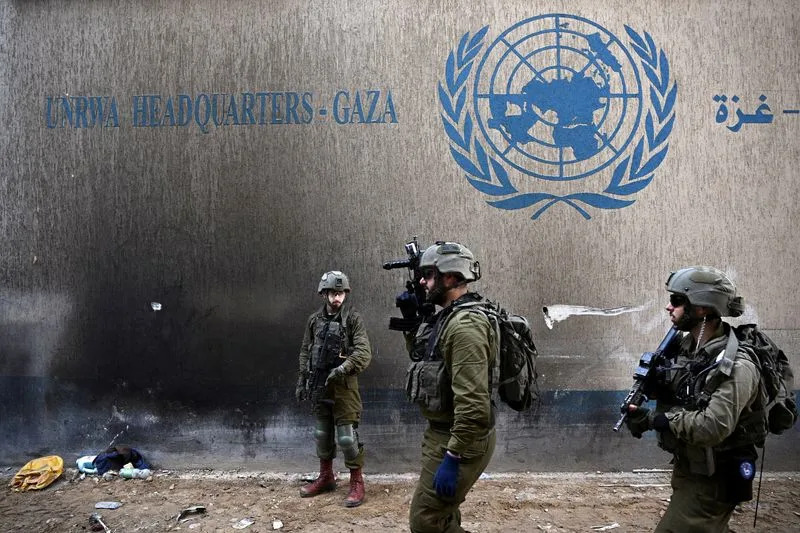GM Golden Rice Stopped
The Deception of Development and the Politics of Progress
On 19 April 2024, the Philippines Supreme Court issued a cease-and-desist order on the commercial propagation of genetically modified (GM) Golden Rice and GM eggplant in the country.
The Stop Golden Rice Network says that the court decision is a victory for farmers and consumers everywhere as the decision goes beyond Golden Rice and insecticidal eggplant and covers “any application for contained use, field testing, direct use as food or feed or processing, commercial propagation, and importation of GMOs.”
The court recognised that government agencies and other proponents of GM Golden Rice and GM eggplant “failed to submit proof of safety and compliance with all legal requirements.” The order remains indefinite until GMO proponents can fulfil all the mandated steps and provide concrete evidence that these GMOs are indeed safe.
A network of farmers, consumers and civil society organisations, Stop Golden Rice emphasises the need to address hunger and malnutrition through securing small farmers’ control over resources such as seed, appropriate technologies, water and land.
The campaign group says:
We believe that GM crops are primarily pushed by global monopoly capitalists in food and agriculture… there is already irrevocable evidence of the failure of GM crops and how it has contributed to further indebtedness, crop failures, hunger and loss of biodiversity.
It states that the court’s decision shows that ordinary people can prevail in the face of corporate power.
The story of Golden Rice
Vitamin A deficiency is a problem in many poor countries in the Global South and leaves millions at high risk of infection, diseases and other maladies, such as blindness.
The agritech industry has long argued that Golden Rice is a practical way to provide poor farmers in remote areas with a subsistence crop capable of adding much-needed vitamin A to local diets. Lobbyists say that Golden Rice, developed with funding from the Rockefeller Foundation, could help save the lives of around 670,000 children who die each year from Vitamin A deficiency and another 350,000 who go blind.
Such claims, however, are based more on spin than reality, and, over the years, the interests behind Golden Rice have wasted no time in attacking anyone who questioned it.
As Britain’s Environment Secretary in 2013, the now disgraced Owen Paterson claimed that opponents of GM were “casting a dark shadow over attempts to feed the world”. He called for the rapid roll-out of vitamin A-enhanced rice to help prevent the cause of up to a third of the world’s child deaths. He claimed:
It’s just disgusting that little children are allowed to go blind and die because of a hang-up by a small number of people about this technology. I feel really strongly about it. I think what they do is absolutely wicked.
On Twitter, The Observer’s Nick Cohen chimed in with his support by tweeting:
There is no greater example of ignorant Western privilege causing needless misery than the campaign against genetically modified golden rice.
The rhetoric took the well-worn cynically devised PR line that anti-GM activists and environmentalists are little more than privileged, affluent people residing in rich countries and are denying the poor the supposed benefits of GM crops.
Despite these smears and emotional blackmail, in a 2016 article in the journal Agriculture & Human Values Glenn Stone and Dominic Glover found little evidence that activists were to blame for Golden Rice’s unfulfilled promises.
Researchers still had problems developing beta carotene-enriched strains that yield as well as non-GM strains already being grown by farmers. It was questionable whether the beta carotene in Golden Rice could even be converted to vitamin A in the bodies of badly undernourished children. There had also been little research on how well the beta carotene in Golden Rice would hold up when stored for long periods between harvest seasons or when cooked using traditional methods common in remote rural locations.
In the meantime, Glenn Stone noted that, as the development of Golden Rice crept along, the Philippines had managed to slash the incidence of Vitamin A deficiency by non-GM methods.
So, whose interests were really being served in the push for Golden Rice?
In 2011, Marcia Ishii-Eiteman, a senior scientist with a background in insect ecology and pest management, answered this question:
An elite, so-called Humanitarian Board where Syngenta sits – along with the inventors of Golden Rice, Rockefeller Foundation, USAID and public relations and marketing experts, among a handful of others. Not a single farmer, indigenous person or even an ecologist or sociologist to assess the huge political, social and ecological implications of this massive experiment. And the leader of IRRI’s Golden Rice project is none other than Gerald Barry, previously Director of Research at Monsanto.
Sarojeni V Rengam, executive director of Pesticide Action Network Asia and the Pacific, called on the donors and scientists involved to wake up and do the right thing:
Golden Rice is really a ‘Trojan horse’; a public relations stunt pulled by the agribusiness corporations to garner acceptance of genetically engineered (GE) crops and food… money and efforts would be better spent on restoring natural and agricultural biodiversity rather than destroying it by promoting monoculture plantations and GE food crops.
To tackle disease, malnutrition and poverty, you have to first understand the underlying causes – or indeed want to understand them.
Renowned academic Walden Bello notes that the complex of policies that pushed the Philippines into an economic quagmire over the past few decades is due to ‘structural adjustment’ that included the restructuring of agriculture and export-oriented production.
And that restructuring of the agrarian economy is something touched on by Claire Robinson of GMWatch who notes that leafy green vegetables used to be grown in backyards as well as in rice (paddy) fields on the banks between the flooded ditches in which the rice grew.
Ditches also contained fish, which ate pests. People thus had access to rice, green leafy veg and fish – a balanced diet that gave them a healthy mix of nutrients, including plenty of beta-carotene.
But indigenous crops and farming systems have been replaced by monocultures dependent on chemical inputs. Green leafy veg were killed off with pesticides, artificial fertilisers were introduced, and the fish could not live in the resulting chemically contaminated water. Moreover, decreased access to land meant that many people no longer had backyards containing leafy green veg.
Blindness in developing countries could have been eradicated years ago if only the money, research and publicity put into Golden Rice over the last 20 years had gone into proven ways of addressing Vitamin A deficiency. However, instead of pursuing genuine solutions, what we have seen is pro-GM spin in an attempt to close down debate.
Technology and development
If the discussion so far tells us anything, it is that technology is not neutral. It is developed and promoted by people who want to cement their control over a sector and stand to financially gain from its rollout.
All too often, politicians, corporations and the media equate new technology with ‘progress’. And those who question it, as we see with GMOs, are called Luddites or anti-science in order to prevent proper debate over the social, economic and ethical concerns of rolling out a given technology.
Take the Green Revolution, for instance. There was nothing progressive, inevitable or neutral about its seed, chemical and related infrastructure technology.
Despite it being rolled out under the banner of ‘progress’, it underperformed, was exploitative and has had devastating social, ecological and environmental impacts (see the writings of Prof. Glenn Stone, Vandana Shiva and Bhaskar Save). It served US geopolitical, financial and agribusiness interests and prioritised urban-industrial expansion at the expense of rural communities and a more diverse, healthy and nutrient-sufficient agriculture.
But the Green Revolution became integral to the ‘development’ agenda.
In a recent article on the Winter Oak website, Paul Cudenec says that ‘development’:
… is the destruction of nature, now seen as a mere resource to be used for development or as an empty undeveloped space in which development could, should and, ultimately, must take place. It is the destruction of natural human communities, whose self-sufficiency gets in the way of the advance of development, and of authentic human culture and traditional values, which are incompatible with the dogma and domination of development.
Cudenec argues that those behind ‘development’ have been destroying everything of real value in our natural world and our human societies in the pursuit of personal wealth and power. Moreover, they have concealed this crime behind all the positive-sounding rhetoric associated with development on every level.
Nowhere is this more apparent than in India.
The World Bank, the World Trade Organization, global agribusiness and financial capital are working to corporatise India’s agriculture sector. This ‘structural adjustment’ policy and process involves displacing the current food production system with contract farming and an industrial model of agriculture and food retail that serves the above interests.
The plan is to displace the peasantry, create a land market and amalgamate landholdings to form larger farms that are more suited to international land investors and export-oriented industrial farming.
The demand is that India sacrifice its farmers and its own food security for the benefit of a handful of billionaires. This is all passed off as ‘development’.
It involves the state facilitating the enrichment of a wealthy elite and privileging a certain model of social and economic development based on urban sprawl, centralised power and dependency on global finance, corporations, markets and supply chains. All legitimised under the banners of innovation, technological progress and ‘development’.
There are other pathways that humanity can take. Anthropologist Felix Padel and researcher Malvika Gupta offer some insights (based on their work with India’s Adivasi communities) into what the solutions or alternatives to ‘development’ might look like:
Democracy as consensus politics rather than the Western model of liberal democracy that perpetuates division and corruption behind the scenes; exchange labour rather than the ruthless, anti-life logic of ‘the market’; law as reconciliation rather than judgements that depend on exorbitant legal fees and divide people into winners and losers… and learning as something to be shared, not competed over.
However, we see more ‘development’ being proposed: more rural population displacement and human dislocation, more mining, port and other big infrastructure developments and the further entrenchment of corporate interests and their projects.
While many have a different vision for the future, self-interest and consumerism underpinned by economic neoliberal dogma continue to seduce the masses into accepting the prevailing ‘development’ agenda.
Corporate industrial agriculture is integral to that agenda. A model that took hold half a century ago in the Western nations and which has resulted in nutrient-deficient food, narrower diets, the massive use of agrochemicals, food contaminated by hormones, steroids, antibiotics and a wide range of chemical additives, the eradication of many smallholder farmers, spiralling rates of ill health, degraded soil and contaminated and depleted water supplies.
That’s ‘progress’? Well, agribusiness interests aside, perhaps so for the many private health clinics that have sprung up in India in recent years.
The introduction of GMOs represents a further entrenchment of the prevailing ‘development’ agenda.
The decision by the Philippines Supreme Court called out government agencies and those behind the Golden Rice agenda for key failures. This is important for India, whose Supreme Court is about to decide on whether to sanction the commercial cultivation of GM mustard. It would be India’s first GM food crop (of which there are many more in the pipeline).
Will India’s Supreme Court come down on the side of reason and stop GM mustard on the basis of there being no need for GMOs in Indian agriculture and the well-documented fraud and regulatory delinquency that has surrounded this issue for many years?
That remains to be seen.









